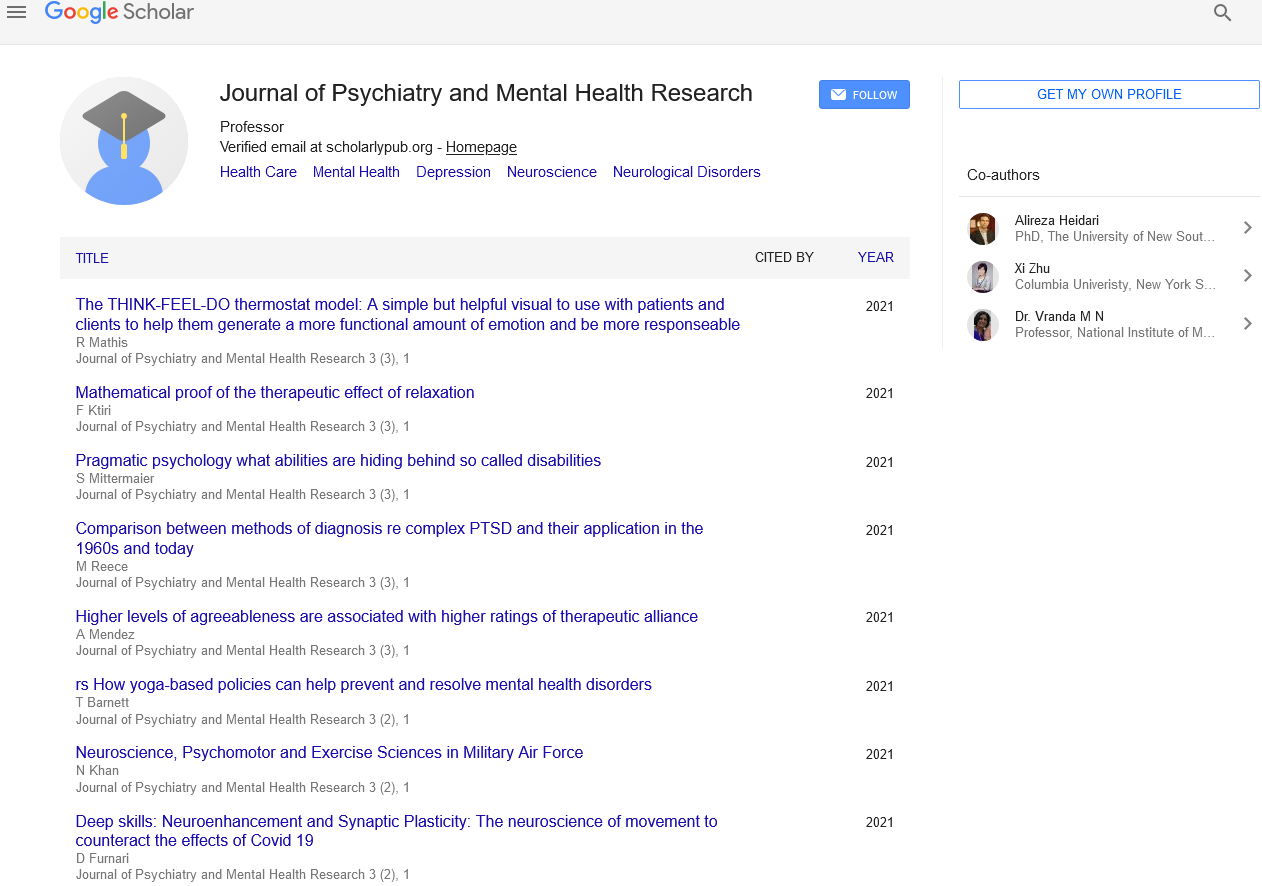Mental Health Management: Approaches, Strategies, and the Role of Comprehensive Care
Received: 29-Mar-2024, Manuscript No. pulpmhr-25-7384; Editor assigned: 02-Apr-2024, Pre QC No. pulpmhr-25-7384 (PQ); Accepted Date: Apr 29, 2024; Reviewed: 15-Apr-2024 QC No. pulpmhr-25-7384 (QC); Revised: 26-Apr-2024, Manuscript No. pulpmhr-25-7384 (R); Published: 30-Apr-2024
This open-access article is distributed under the terms of the Creative Commons Attribution Non-Commercial License (CC BY-NC) (http://creativecommons.org/licenses/by-nc/4.0/), which permits reuse, distribution and reproduction of the article, provided that the original work is properly cited and the reuse is restricted to noncommercial purposes. For commercial reuse, contact reprints@pulsus.com
Abstract
Mental health management is a crucial aspect of healthcare that focuses on addressing and improving the psychological well-being of individuals. Mental health conditions, such as depression, anxiety, and bipolar disorder, have become increasingly prevalent worldwide, making effective management strategies essential. This article explores various approaches to mental health management, including pharmacological treatments, psychotherapy, lifestyle interventions, and community-based support systems. It emphasizes the importance of a holistic and individualized approach, which integrates medical, psychological, and social support. Additionally, the article examines the role of mental health education, stigma reduction, and early intervention in improving outcomes for individuals with mental health challenges.
Key Words
Mental health management; Psychological well-being; Depression; Anxiety; Therapy; Pharmacological treatment; Lifestyle interventions; Stigma reduction; Mental health education; Early intervention
Introduction
Mental health management has gained significant attention in recent years due to the rising global prevalence of mental health disorders and the growing awareness of their impact on individuals and society. Conditions like depression, anxiety disorders, and substance abuse are some of the leading causes of disability worldwide, highlighting the need for effective management strategies. While many individuals with mental health issues receive treatment, there is still a significant gap in access to care, particularly in underserved populations. This article explores the various approaches to managing mental health conditions, including treatment options, strategies for prevention, and the importance of comprehensive, individualized care.
Discussion
One of the most common approaches to managing mental health disorders is through medication. Antidepressants, anti-anxiety medications, antipsychotics, and mood stabilizers are commonly prescribed to help regulate mood, thought processes, and behavior. While pharmacological treatments can be highly effective, they are often most beneficial when combined with other therapeutic approaches. Moreover, finding the right medication and dosage for an individual requires careful monitoring by healthcare professionals, as there can be varying side effects and responses across patients. Psychotherapy plays a pivotal role in mental health management.
Cognitive Behavioral Therapy (CBT) is one of the most widely used and evidence-based forms of psychotherapy. It focuses on helping individuals recognize and change negative thought patterns that contribute to emotional distress. Other therapeutic approaches, such as psychodynamic therapy, dialectical behavior therapy (DBT), and family therapy, can also be effective depending on the individual's needs. Therapy can help individuals develop coping strategies, improve emotional regulation, and address the root causes of their mental health issues. A healthy lifestyle can significantly enhance mental health outcomes. Regular physical activity, a balanced diet, and sufficient sleep are essential components of mental well-being. Exercise, for example, has been shown to reduce symptoms of depression and anxiety by promoting the release of endorphins and improving brain function. Mindfulness practices, such as meditation and yoga, are also beneficial for reducing stress and enhancing emotional resilience. Encouraging individuals to engage in healthy lifestyle habits can complement other forms of treatment and support long-term mental health. Mental health management extends beyond clinical treatments. Community-based support systems, including peer support groups, mental health education, and social services, play an important role in promoting mental well-being. These systems can offer emotional support, reduce isolation, and help individuals connect with others facing similar challenges. Community-based programs can also raise awareness, reduce stigma, and provide education on mental health issues, fostering a more supportive and inclusive environment for those affected.
One of the most significant barriers to effective mental health management is stigma. Many individuals experiencing mental health issues hesitate to seek help due to the fear of being judged or misunderstood. Reducing stigma through education, open discussions, and media representation is crucial in encouraging individuals to seek treatment and support. Mental health education in schools, workplaces, and communities can also help individuals recognize symptoms, understand the importance of mental health, and seek timely care.
Conclusion
Effective mental health management requires a multifaceted approach that combines pharmacological treatments, psychotherapy.
Challenges and Opportunities
Lifestyle interventions, and social support. A holistic and individualized care plan that addresses the unique needs of each patient is essential for improving outcomes and promoting overall mental well-being. Early intervention, stigma reduction, and mental health education play critical roles in enhancing the accessibility and effectiveness of mental health care. As the global awareness of mental health continues to grow, it is essential that healthcare systems, communities, and individuals work together to provide comprehensive support and ensure that those affected by mental health conditions receive the care they need. By promoting integrated care and fostering a more inclusive society, we can help individuals lead healthier, more fulfilling lives.





